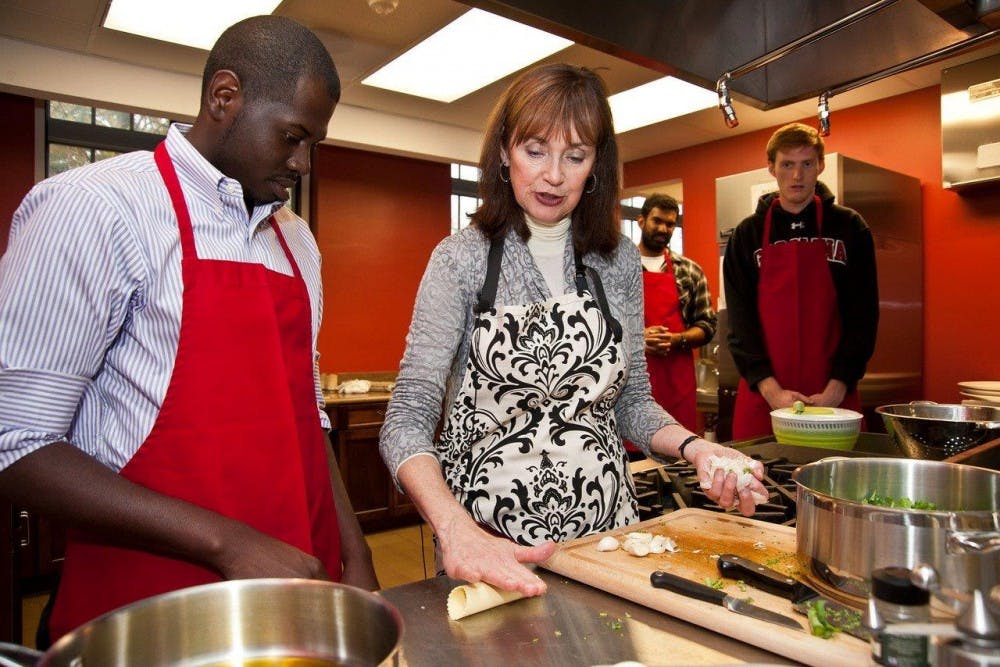Ever wanted to prevent heart disease and stroke? What about high blood pressure, high cholesterol, asthma, allergies and diabetes? Or maybe breast, colon and prostate cancers?
Patricia Moore-Pastides, the university’s first lady, may have the answer: a Mediterranean diet.
Though her own father died of a heart attack in his fifties, Moore-Pastides is optimistic about new research that has shown that a healthy diet can overcome genetic predispositions and help to avert diseases.
“Everything that’s affecting Americans, like all these health issues, can be averted, I believe, if we live a healthy [life]style,” Moore-Pastides said. “No one’s going to change their way of eating if they don’t like the way the food tastes, but I knew the foods would be really good.”
Moore-Pastides has a background in public health, but she first got interested in the Mediterranean diet when she and her husband took a sabbatical in Greece in the 1980s.
“I fell in love with that aspect of health, and when we lived in Greece, I really fell in love with the food,” Moore-Pastides said. “I had been studying the Mediterranean diet and I knew it was so healthy. It’s one of the healthiest diets on the planet.”
She was intrigued by the health value of the diet, which included eating more whole grains and beans, more fruits and vegetables, fewer processed foods and consuming meat and seafood in smaller quantities. She also enjoyed studying the culture surrounding the Mediterranean culinary tradition.
“It’s not just the foods that are eaten, but it’s the way they’re eaten. They don’t eat in the car, or at their desk. It’s like you sit down at the table and eat a leisurely meal with your family and friends and you talk, and you enjoy it, and you take your time,” Moore-Pastides said. “It gives more pleasure and more health from something that could otherwise just be a function.”
Moore-Pastides had mentioned writing a cookbook several times, but when she and her husband returned to Cyprus she became serious about the endeavor. She spent their second sabbatical testing recipes that she could include.
“The best part of it for me is that I really just love it. It’s how I like to live. It’s what I believe in,” Moore-Pastides said. “It makes me feel like I really have a mission in my life to share this information.”
She started writing her first cookbook, “Greek Revival: Cooking for Life,” in 2006, and it was published in 2010.
“My vision for the first book,” Moore-Pastides said, “was that it would really teach people about the health benefits of the Mediterranean diet, but it would also give really beautiful pictures and delicious recipes that would win them over.”
In addition to the recipes, the book includes summaries of studies from as far back as the 1950s that support the health benefits of a Mediterranean diet, though Moore-Pastides took care not to make it too clinical, allowing the book to be easily understandable for all readers. Her second book, “Greek Revival from the Garden: Growing and Cooking for Life,” was published last year. Since interest for her first book came primarily from middle-aged readers, she wanted her second book to target young people.
This time, she focused on growing vegetables organically, hoping that people would be more interested in trying foods that they grew themselves. Moore-Pastides included information on how to grow vegetables and then how to prepare them.
“I think so many young people are interested in having a healthy food supply and not eating a lot of processed foods and being a little reluctant about the commercially raised meat,” Moore-Pastides said. “If we can get people growing vegetables then they’ll really want to eat more of them.”
Her second book is already in its second printing and has won several awards. It was awarded the 2014 Hoffer Award in the Home category over the summer, an award designed to recognize the “independent spirit of small publishers,” and was also named a finalist in the 2014 International Book Awards.
Moore-Pastides attributes the success of her books to individuals’ recent tendency to seek out healthier foods as well as the surprising lack of Greek cookbooks. Her books provide more traditional, less westernized versions of the recipes made popular at Greek restaurants and Greek festivals.
“I think they’ve been successful because people are very concerned about their health and you see a lot of people now thinking about what they’re eating. I think both of these books are sort of tools for people for healthy living,” Moore-Pastides said.
When she’s not writing cookbooks or visiting her newest grandchild, Moore-Pastides is typically teaching cooking classes at the McCutchen House or Columbia’s Cooking. She also travels around the state talking about eating well. She gives 30 to 50 presentations each year to sororities, rotary clubs, garden clubs or whoever else requests her to speak.
“They’re thinking they don’t need a cookbook,” Moore-Pastides said, “but at the end of the presentation they’re buying not only one book, but buying three because they think of two other people that could really use it.”

